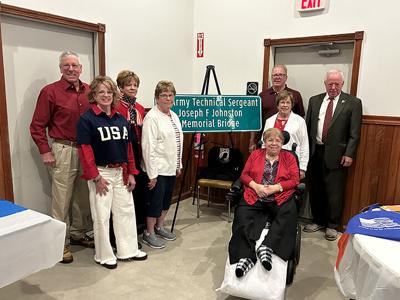State Sen. Judy Ward described her uncle and godfather, U.S. Army Technical Sergeant Joseph F. Johnston, as a “silent hero.”
“He was a man of few words, but he lived every single day grateful to God for his life,” she said. “And he felt that God had spared him during World War II because he saw quite a bit.”
But while his military record is impressive, Johnston was also a family man committed to his church and his community.
“He was the person we should all strive to be,” Ward said.
Bridge Key 8392, carrying Route 53 over Bruebaker Run in Dean Township, has now been designated in Johnston’s honor, and his family and friends held a special ceremony at the Loretto American Legion marking this special event April 19.
The bill to name the bridge after Johnston was co-sponsored by Ward and state Sen. Wayne Langerholc, whose district includes Dean Township. The bill was unanimously passed and signed into law by Gov. Josh Shapiro on Oct. 23, 2023.
“Today we gather to honor the valor of a true American hero,” Langerholc said.
Johnston was born in Dean on Nov. 27, 1917. After graduating from Cresson High School in 1938, he worked in the mines for a few years before enlisting in the Army in June 1941.
Johnston spent his service in locations throughout the European Theatre during World War II, including Algeria, Morocco, Tunisia, Sicily, Normandy, Belgium and Germany.
During the battles in Tunisia, Johnston took command of his platoon in the absence of his platoon leader and sergeant. In blackout conditions, Johnston led his platoon under heavy enemy shelling and gunfire through mountainous terrain to deliver supplies to those on the front lines.
For his actions, Johnston was awarded the rank of technical sergeant and platoon leader and was awarded the Legion of Merit.
His other accolades include a Bronze Star, Silver Star and European African Middle Eastern Service Medal.
Johnston was discharged from the military June 5, 1945. Following his service, he married Annie Adams, whom he was married to for 65 and half years and raised eight children with her. He passed away on Nov. 7, 2010.
The event hosted several speakers including Command Sergeant Major Joseph Keirn, Petty Officer Phil Waite and former Pennsylvania state commander of the American Legion Ray Lenz, who each spoke on Johnston’s time in the service.
Keirn, who has participated in missing in action recovery efforts, spoke of what Johnston’s experience may have been like during the battle of Hürtgen Forest in Germany.
“Hürtgen Forest was the longest and most devastating battle ever fought by the United States’ Army in Germany,” Keirn said.
“This battle lasted five months, and Sgt. Johnston was in for the duration.”
Keirn said there were 34,900 casualties from this battle, as well as 17,000 non-battle casualties and 2,000 prisoners of war.
“The men and women of World War II are respected and loved by me,” Keirn said. “They are all heroes. We cannot realize what they’ve seen, what they had to do; we know what they accomplished.”
Lenz said Johnston’s infantry unit was at Utah Beach on June 8, 1944, just two days after D-Day.
“He saw that war was hell,” Lenz said. “And Joe went through hell on earth.”
Waite, who is also a history teacher at Central High School in Martinsburg, said he met Johnston during an event recognizing V-E Day, the day victory was declared in the European Theatre.
Though Johnston rarely spoke of his time in the service, he agreed to allow Waite to interview him and record his story before his passing.
Waite said it was fitting that a bridge be named in honor of a World War II veteran like Johnston.
“He and 16 million United States servicemen and women became a living bridge,” Waite said. “They overcame the obstacle of the Axis nations: Germany, Italy and Japan. It was their dedication, their blood, their sweat, their tears that cemented that living bridge in order for theirs and future generations to enjoy the fruits of liberty and freedom.”
Waite recalled a story of Johnston’s, where Johnston refused having his name put in for a Purple Heart after being injured in battle.
“Joe said, ‘No you’re not [putting my name in]. I don’t want my mother to worry when she receives a telegram that I was actually in combat,’” Waite said.
Ray Johnston, one of Johnston’s eight children, said his father was quiet about his service and that he was “just doing his duty as an American soldier.” Despite his father’s quiet nature, Ray said his descendants are pleased that Johnston’s legacy can live on through this bridge dedication.
“Dad’s probably up in Heaven looking down on us saying, ‘Why are you making such a big fuss?” Ray Johnston said.




(0) comments
Welcome to the discussion.
Log In
Keep it Clean. Please avoid obscene, vulgar, lewd, racist or sexually-oriented language.
PLEASE TURN OFF YOUR CAPS LOCK.
Don't Threaten. Threats of harming another person will not be tolerated.
Be Truthful. Don't knowingly lie about anyone or anything.
Be Nice. No racism, sexism or any sort of -ism that is degrading to another person.
Be Proactive. Use the 'Report' link on each comment to let us know of abusive posts.
Share with Us. We'd love to hear eyewitness accounts, the history behind an article.